It was a steaming hot August afternoon in New York City. I’d arrived just hours before from Toronto with three days of area garden viewing and photography on my agenda. I hadn’t made plans for today, but then I remembered a city garden I hadn’t visited for more than a decade. There were still hours of daylight, albeit crushingly humid hours with temperatures in the mid-90s. So I filled my water bottle, slung my camera bag over my shoulder and headed out of my hotel (Hotel Boutique at Grand Central), conveniently located near Grand Central Station and the 42nd Street Subway. The subway tunnel felt like a tropical jungle, but it was nothing compared to the inside of the subway car heading north, whose air-conditioning was broken. “59-68-77-86”, I counted down the stations, fanning myself madly and hoping I wouldn’t faint before arriving at my stop. When I climbed the stairs to 96th Street (the dividing line between Manhattan’s Upper East Side to the south and Spanish Harlem to the north), the humidity was even higher. I’d only walked a block or two westward towards Central Park before the first fat raindrops fell. Fortunately, I’d tucked my umbrella into my bag and as the rain became a torrent, I pulled my camera bag closer to me and hurried on. By the time I’d crossed Fifth Avenue and walked north along the park to 105th, people were running out and taking shelter under trees or dashing along the sidewalk to their cars or buses. I, on the other hand, was heading into the park, and as I entered the Conservatory Garden through the Vanderbilt Gate, the rain magically abated and the lawns and hedges steamed in the late day heat. Ahead of me was the formal Italianate garden with its lush lawn and fountain. In May, those crabapple trees on the sides are fluffy clouds of pink and the pergola in the distance is wreathed in wisteria.
I watched a young girl playing in the fountain’s cooling spray.
The Italianate garden is in the middle, one of three sections that make up the 6-acre Conservatory Garden, which is named for the lavish greenhouse that occupied the site from 1899 to 1934, before it was officially opened as a garden in 1937. After the second world war, the garden was increasingly neglected; by the 1970s it was a derelict place Under Central Park Administrator Elizabeth Barlow Rogers and renowned New York designer and public gardens champion Lynden Miller (who also did Bryant Park and numerous other urban spaces), the gardens were completely renovated and reopened in 1987.
At the north end is the French garden….
.. with its low broderie parterres….
… and the Untermyer Fountain, “Three Dancing Maidens”, a 1947 donation to Central Park from the children of famed New York lawyer Samuel Untermyer, whose Yonkers estate is now a conservancy open to the public.
But as a plant-lover, I was interested in revisiting the southernmost section, the English Garden. To get there I walked past the perimeter of the French garden, with its crabapple allées. A few visitors took shelter from the last raindrops under their umbrella.
I passed a raised garden filled with a tapestry-like assortment of luscious tropicals.
Then I was walking into the English Garden under a magnificent sourwood tree (Oxydendrum arboreum), its tiny, pendulous, white blossoms alive with bumble bees. Trees, shrubs and various perennials act as leafy enclosure in the outer beds in the concentric arrangement of hedge-backed plantings in Lynden Miller’s original design. The current curator of the English garden is Diane Schaub, whose talent is very much on display here. (See note at bottom of my blog).
Below is one of Lynden Miller’s favourite shrubs: oak-leaf hydrangea (Hydrangea quercifolia), as the big panicles take on their tawny autumn hues.
The outer bed below features Japanese anemones (Anemone x hybrida), an August mainstay, with cascading Japanese forest grass (Hakonechloa macra ‘Aureola’) in the foreground. Mid-border is another Lynden Miller trademark: a clipped purple barberry globe (Berberis thunbergii), adding a sculpted architectural note. (One of my favourite photos from a visit here in the 1990s was one of these globes graced with deep-violet Clematis durandii.)
Here is a closeup of Japanese anemone with the delicate flowers of Thalictrum rochebrunianum.
White coneflowers (Echinacea) brighten the shade-dappled outer bed under the trees. There’s a lovely colour echo of the cones with the dark foliage of the black bugbane beside it (Actaea racemosa Atropurpurea Group).
Post-rain, the subtle baby-powder fragrance of summer phlox (Phlox paniculata) and the perfume of hosta flowers wafted in the enclosed spaces in the garden.
But as lovely as the mixed perennial-shrub beds were in the outer rings, it was the inner hedged beds in the English Garden that beckoned me. They offered a master class in the use of annuals and tropicals to create exquisite designs that can be changed every year. But these aren’t your grandma’s annuals; there are no impatiens, geraniums or petunias in the garden. Instead, you see statuesque plants in lovely colour combinations that rival any perennial border. The bed below offered fabulous ideas for combining chartreuse foliage with oranges and bronzes.
Here’s a closer look at the inspired pairing of Cuphea ‘David Verity’ — one of many ‘zing’ plants — with a charteuse colocasia.
Who could dislike stiff, old canna lilies when they do THIS in the late afternoon sun? (Especially when paired with bronze fennel flowers and a luscious azure-blue Salvia guaranitica.)
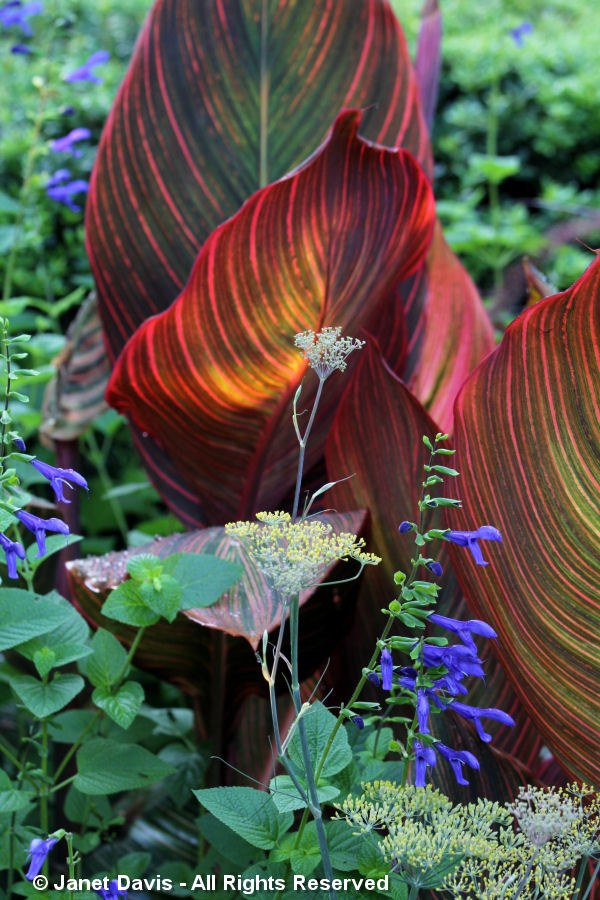
Tender grasses add a punch of colour, too. Below is Pennisetum setaceum ‘Fireworks’. 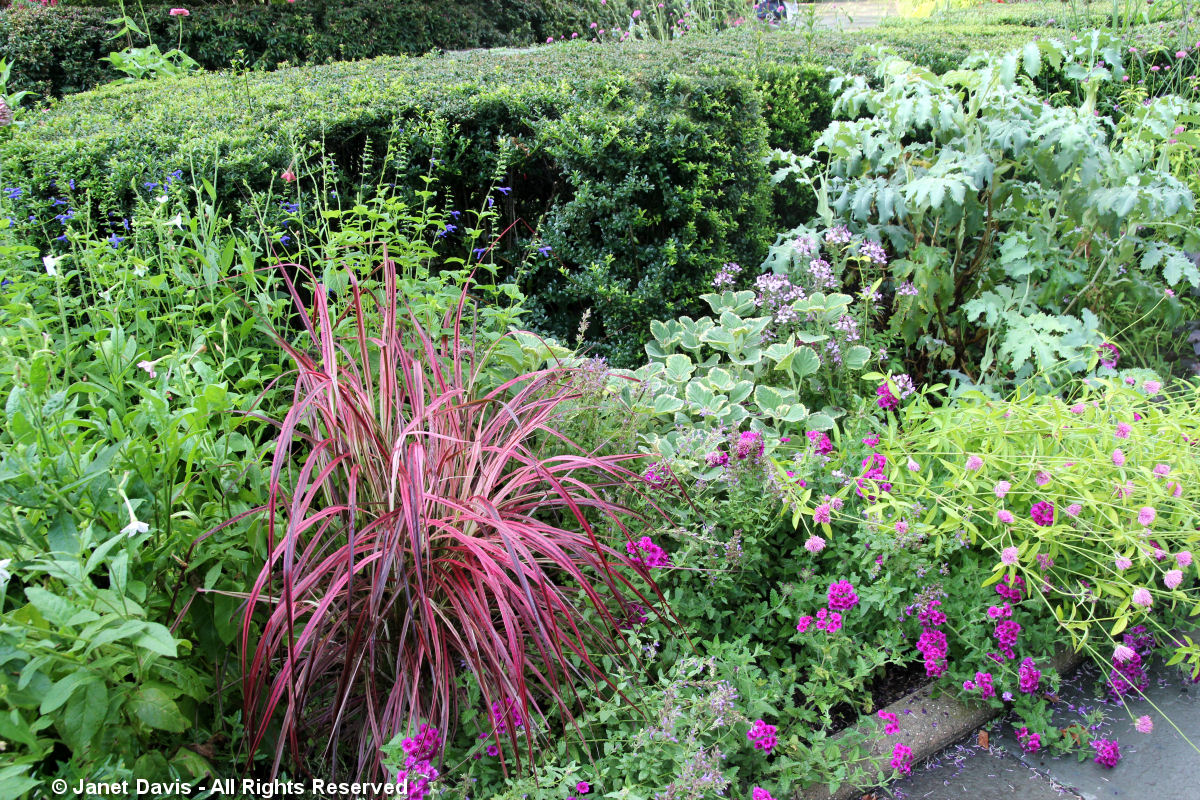
Hedges of Japanese holly (Ilex crenata) and euonymus act as a permanent framework in the inner rings, and both sides are planted with annuals in classic colour combinations. The bed below…….
…..featured a lovely pairing of chartreuse ‘Gay’s Delight’ coleus (Plectranthus scutellarioides) and purple Verbena bonariensis — another good ‘zing’ plant.
Deep burgundy-blacks — like Dahlia ‘Mystic Illusion’, front, and the grass Pennisetum ‘Vertigo’, below — added depth to a dark-foliage border.
Exploring all the inner beds was a challenge. Just when I thought I’d seen them all, I’d turn a corner and spot something entirely new! I loved the way this heuchera (maybe ‘Black Taffeta’?) anchored the design below.
In some hands, pink flowers can be just too cotton-candy sweet. But Diane Schaub used a deft touch, below, to incorporate the pink spires of Agastache cana ‘Heather Queen’ and the zingy pom-poms of Gomphrena ‘Fireworks’ and purple Verbena bonariensis into a pale-green matrix of tropical plants, including variegated Furcraea foetida ‘Mediopicta’, centre, and variegated plectranthus (P. forsteri ‘Green on Green’), right.
Stronger pinks like the verbena, below, were partnered with darker greens, like Colocasia esculenta ‘Blue Hawaii’.
I loved the combination, below, of Gomphrena ‘Fireworks’ and blue pitcher sage (Salvia azurea). Such good clear colours.
Sometimes horns would honk nearby and I would be reminded that I was in a leafy enclave a stone’s throw from one of the most famous streets in the world: Fifth Avenue!
Unusual annual pairings were everywhere. Below is Perilla frutescens with airy Ammi visnaga ‘Green Mist’.
And I adored this vignette of magenta-pink Gomphrena ‘Fireworks’ with lacy centaurea, a deep-red salvia and coleus.
I was very impressed with the way tropical shrub Tibouchina urvilleana, below, was used in the purple border. It looked perfectly at home with magenta Gomphrena globosa and dark pink zinnias.
Finally, that concentric maze of flowery beds led me to the intimate centre of the English Garden, with its enclosing borders and a pink-flowered crepe myrtle (Lagerstromeia indica). Benches were arranged so visitors could…….
…. relax and enjoy an intimate view of the Burnett Memorial Fountain, the centrepiece of the English Garden. Sculpted in 1936-7 by Bessie Vonnoh (1872-1955), it honours children’s book author Frances Eliza Hodgson Burnett (1849-1924) and depicts the children Mary and Dickons from her classic Secret Garden.
I paused for a moment in the secret garden, but towering storm clouds were building in the sky to the west and it was time to head back to my hotel.
I bade farewell to this lovely secret garden and strolled out to catch a southbound bus to midtown. What a lovely first evening for my short New York stay.
** Thanks to my online friend Marie Viljoen (66 Square Feet) for her 2015 Gardenista article on the English Garden, which provided a few of the plant names for my photos above.

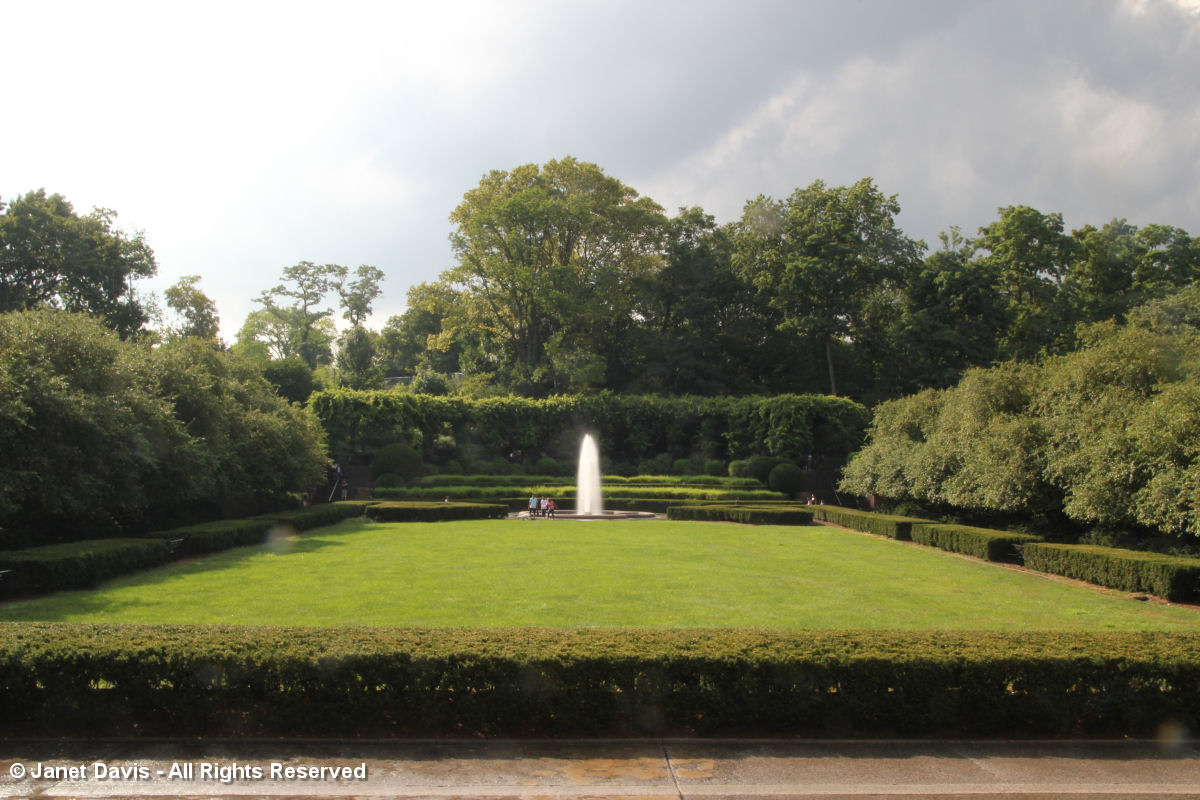
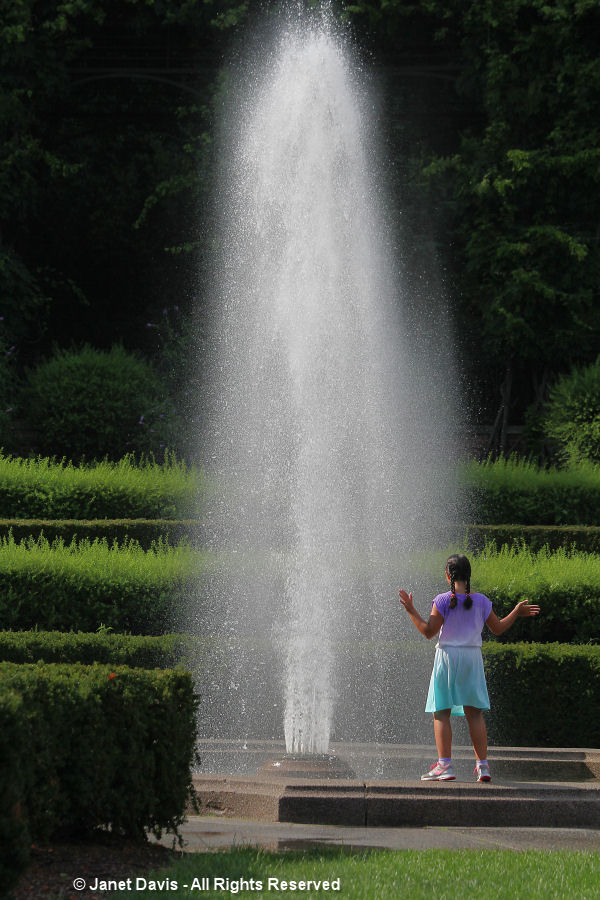
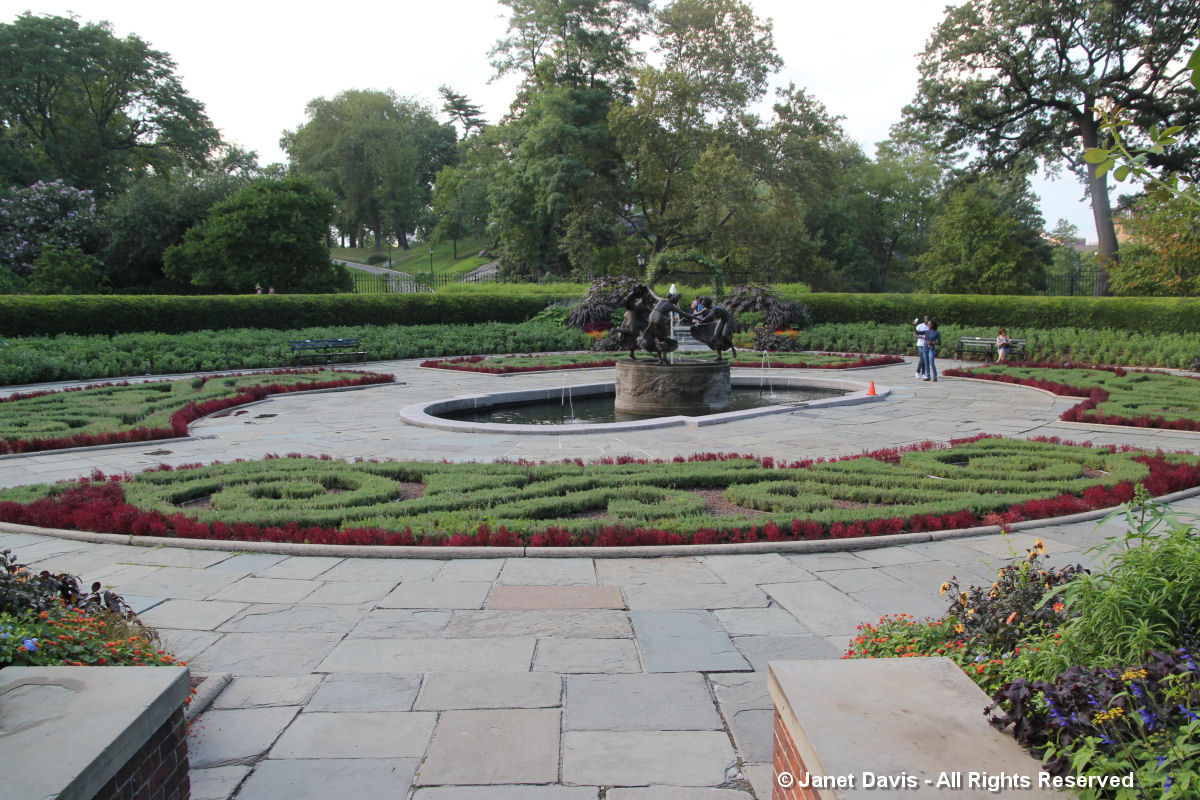
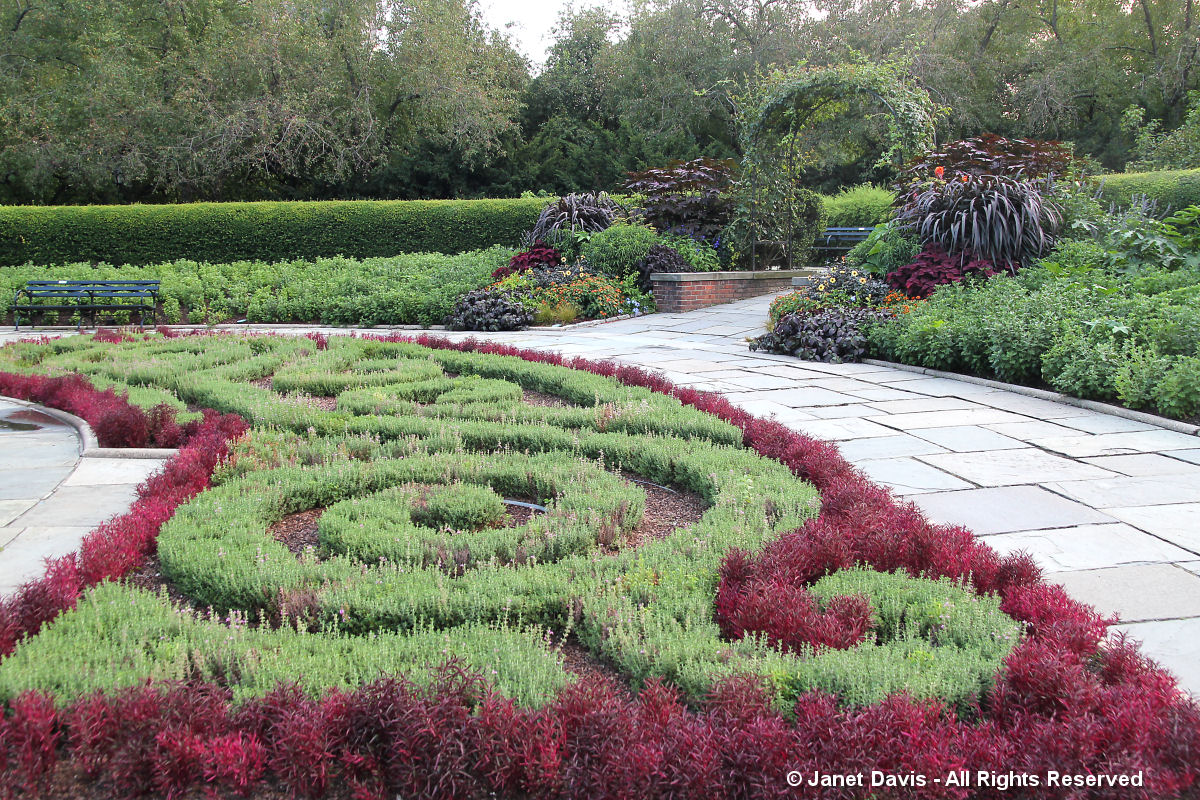
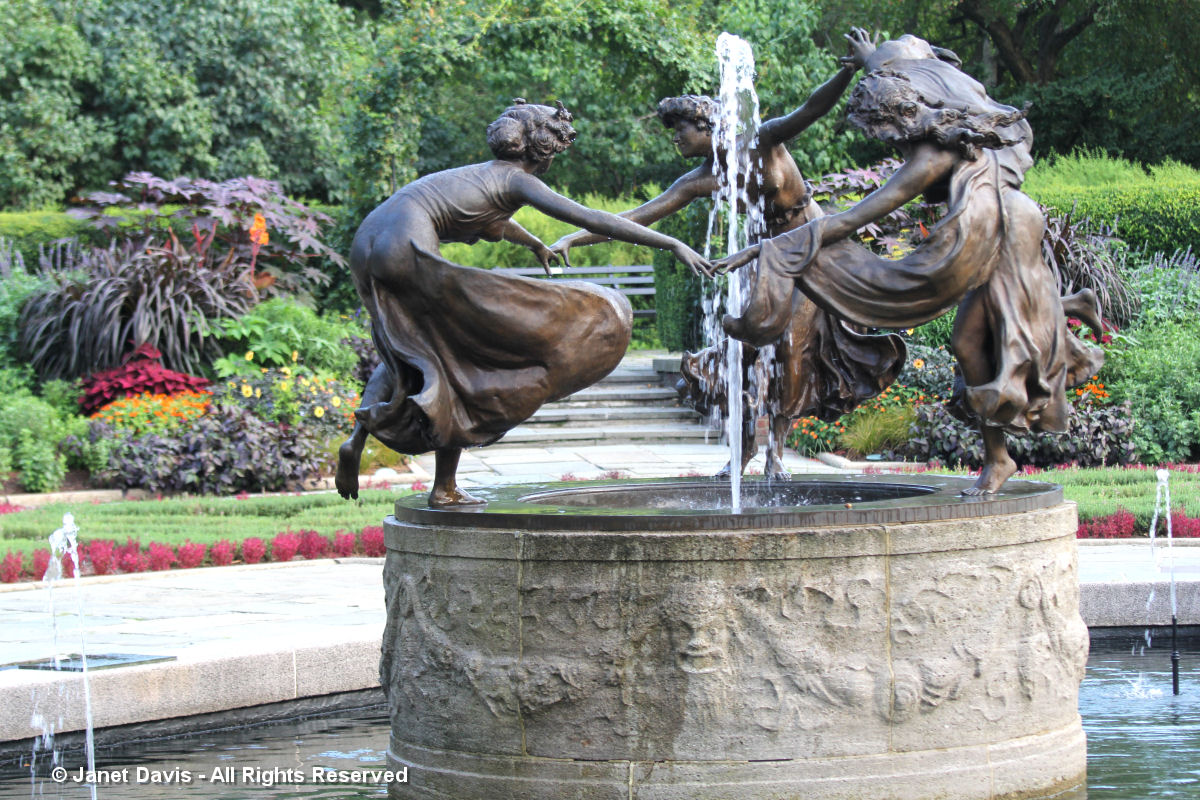
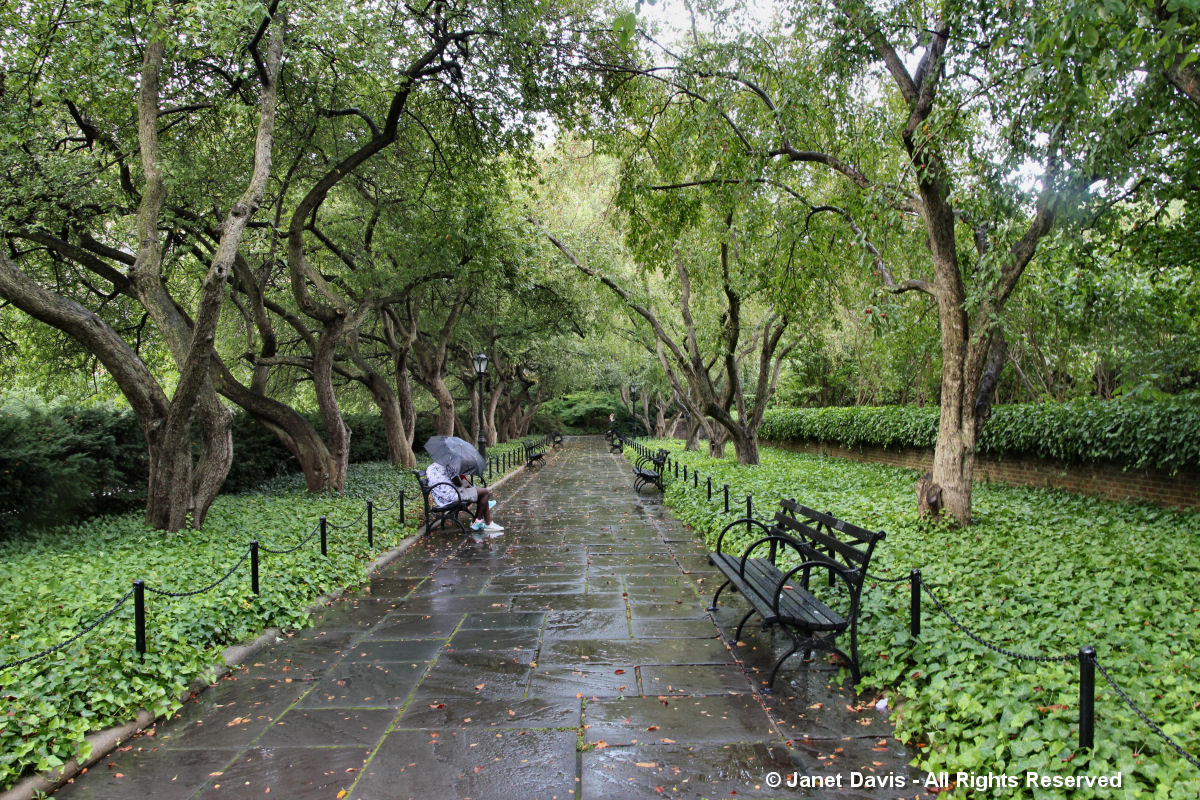
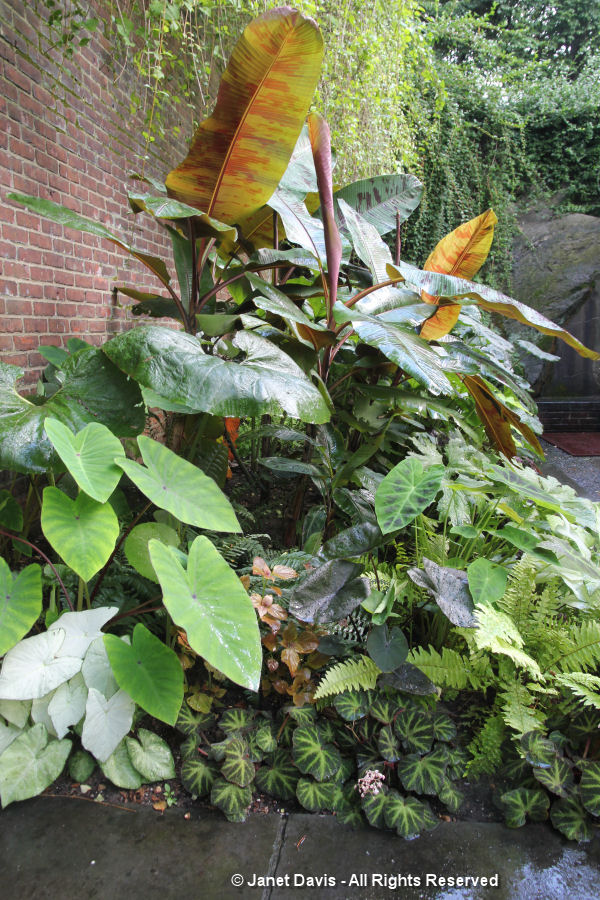
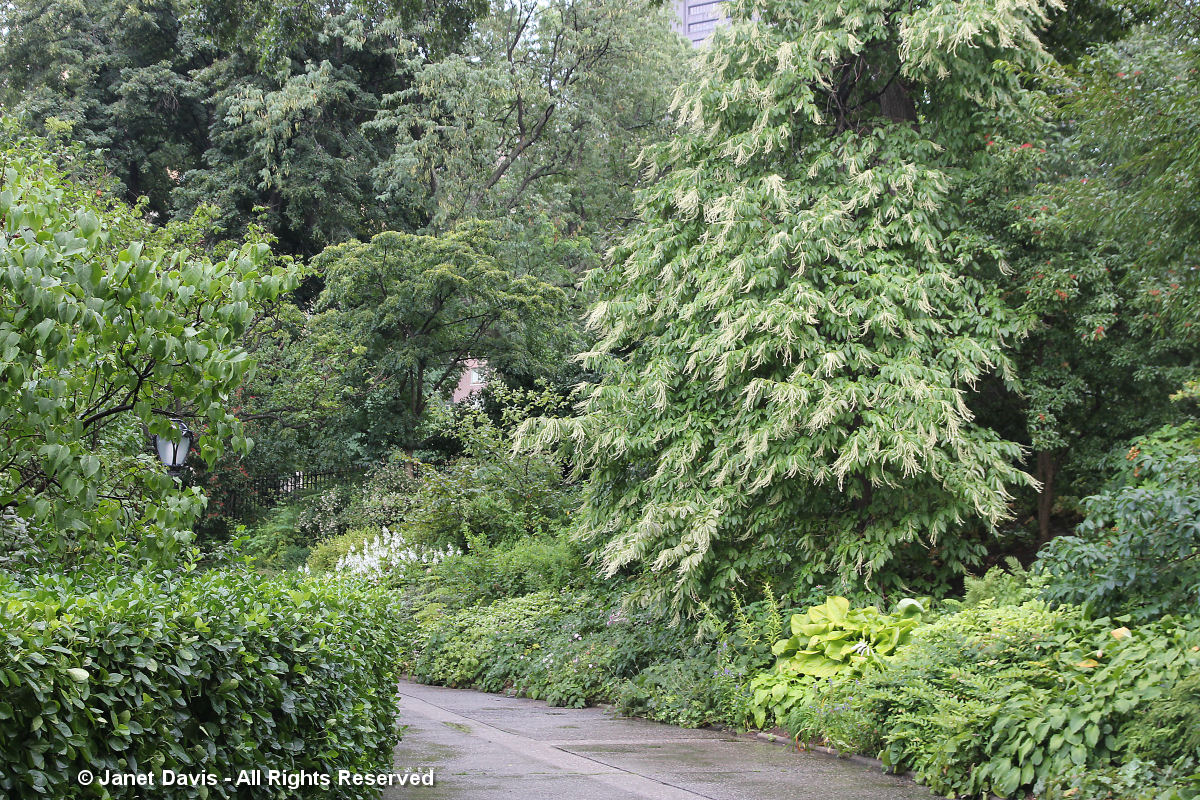
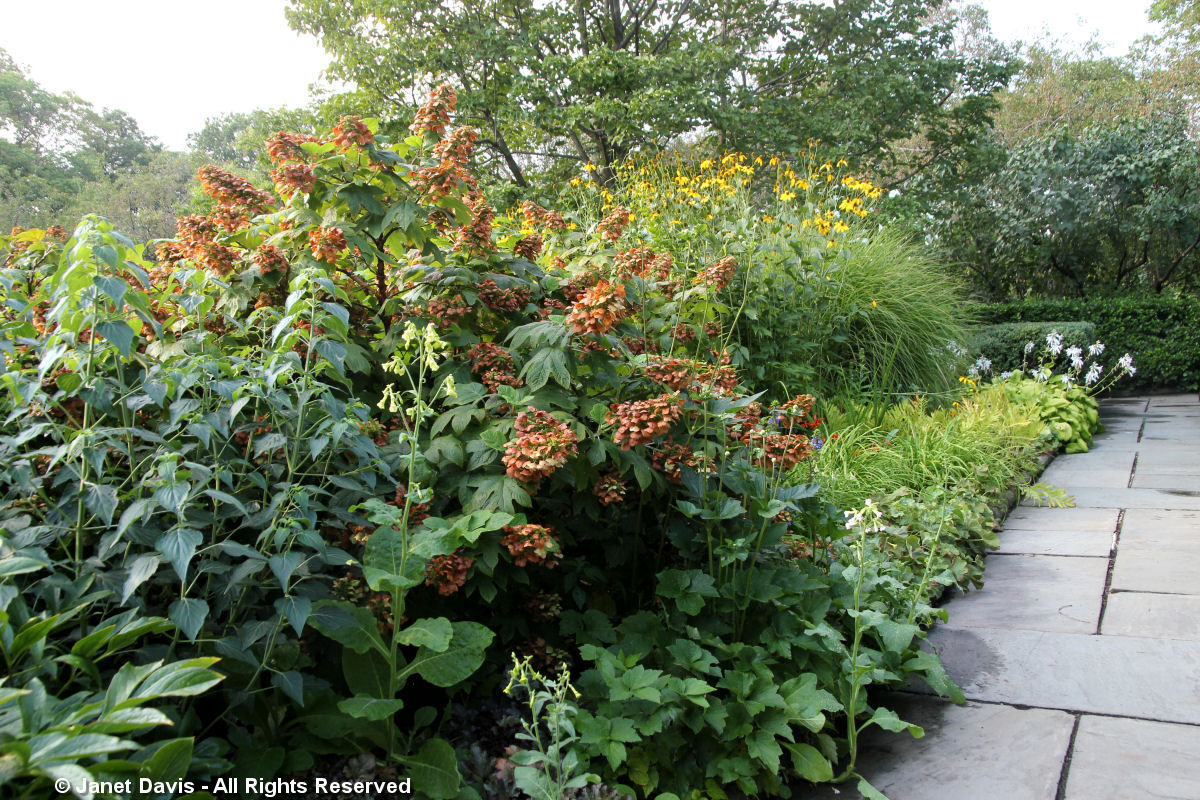
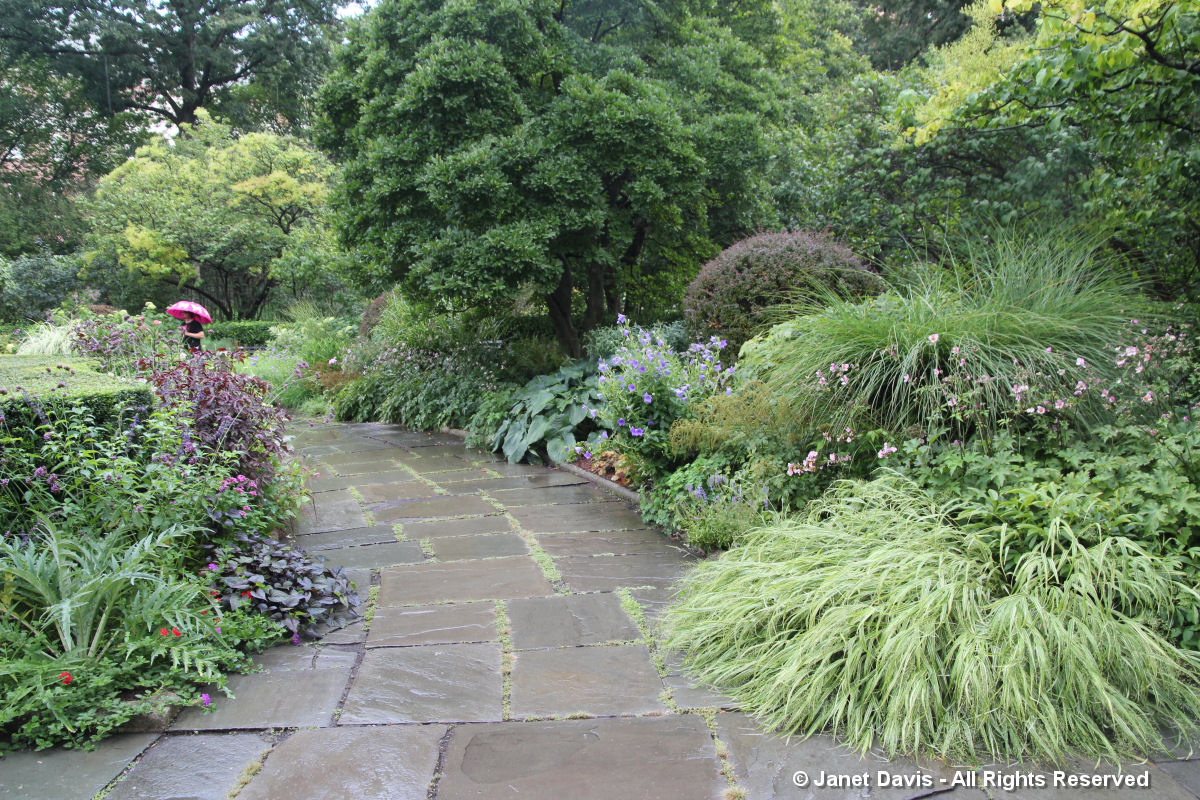
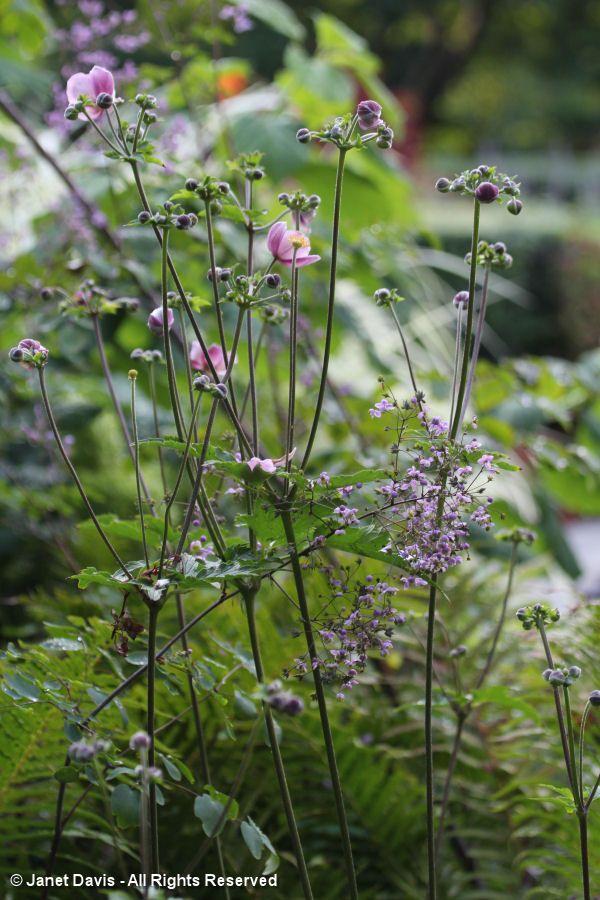
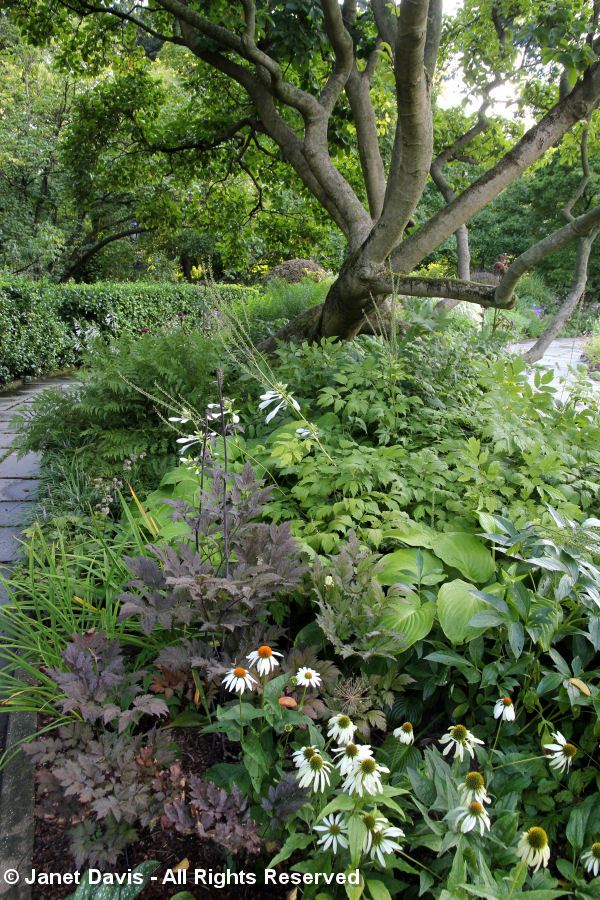
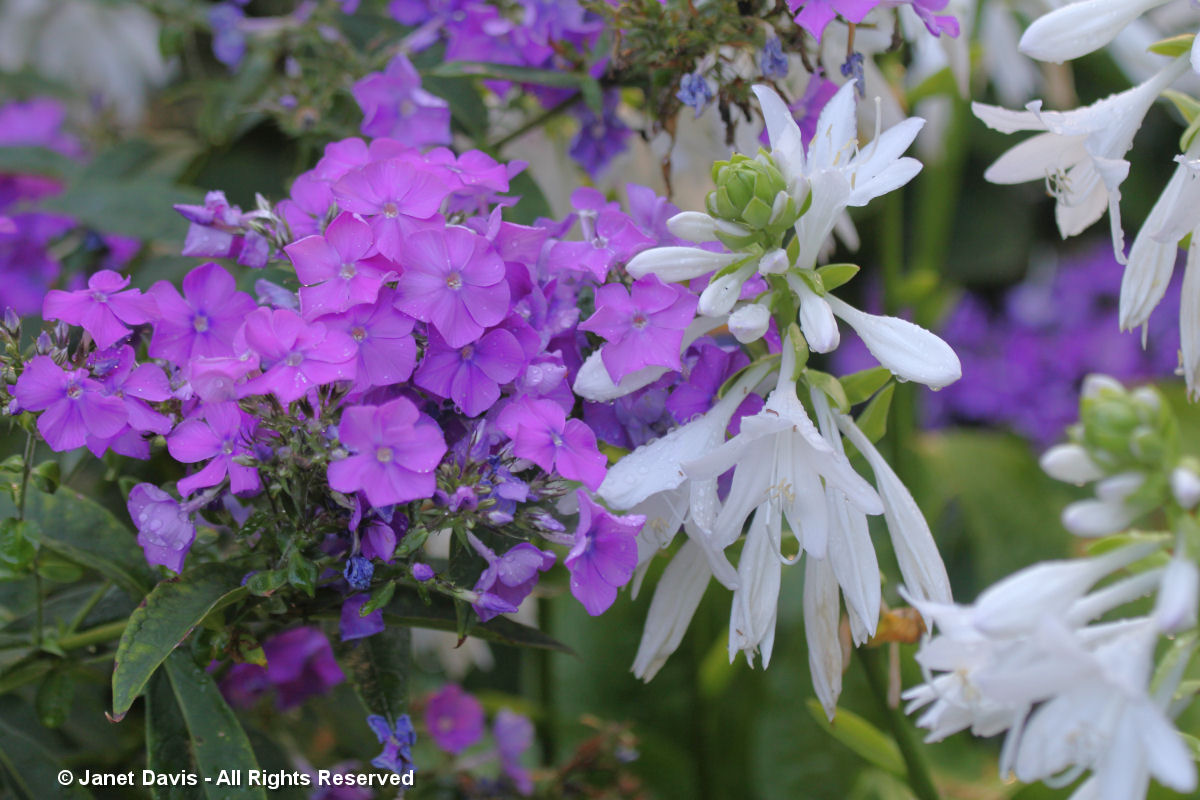
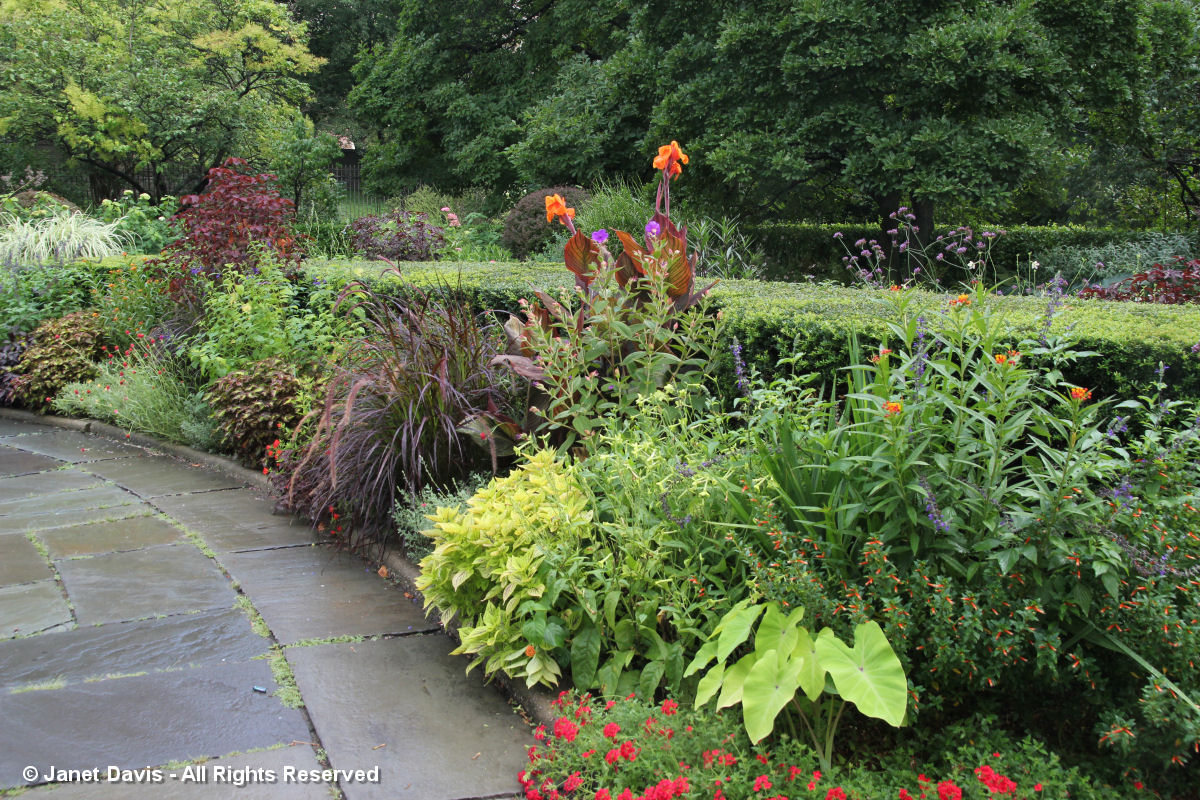
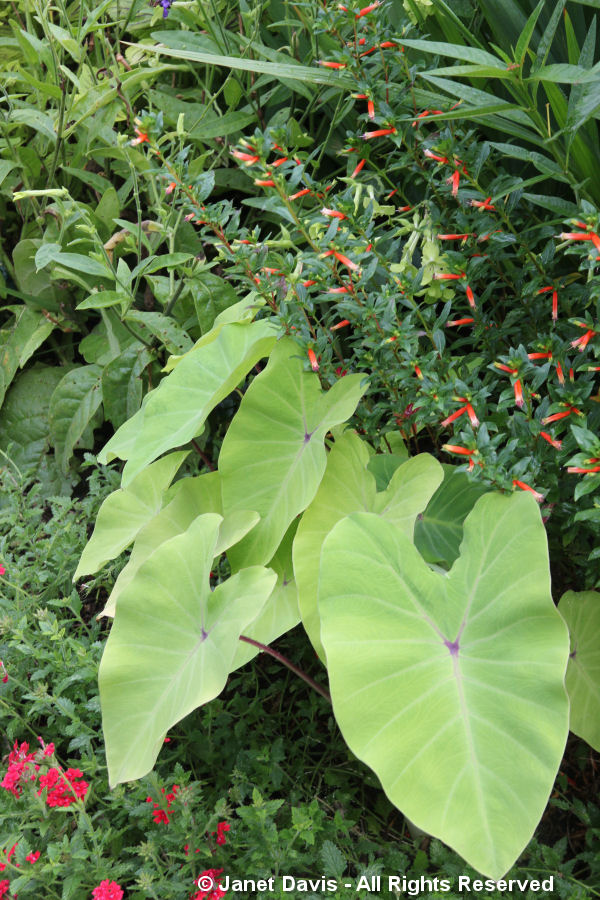
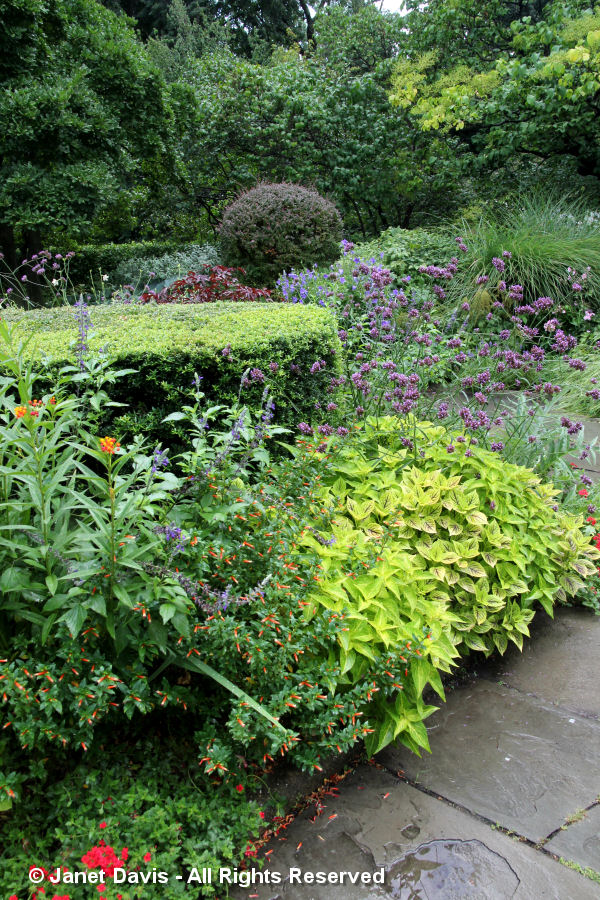
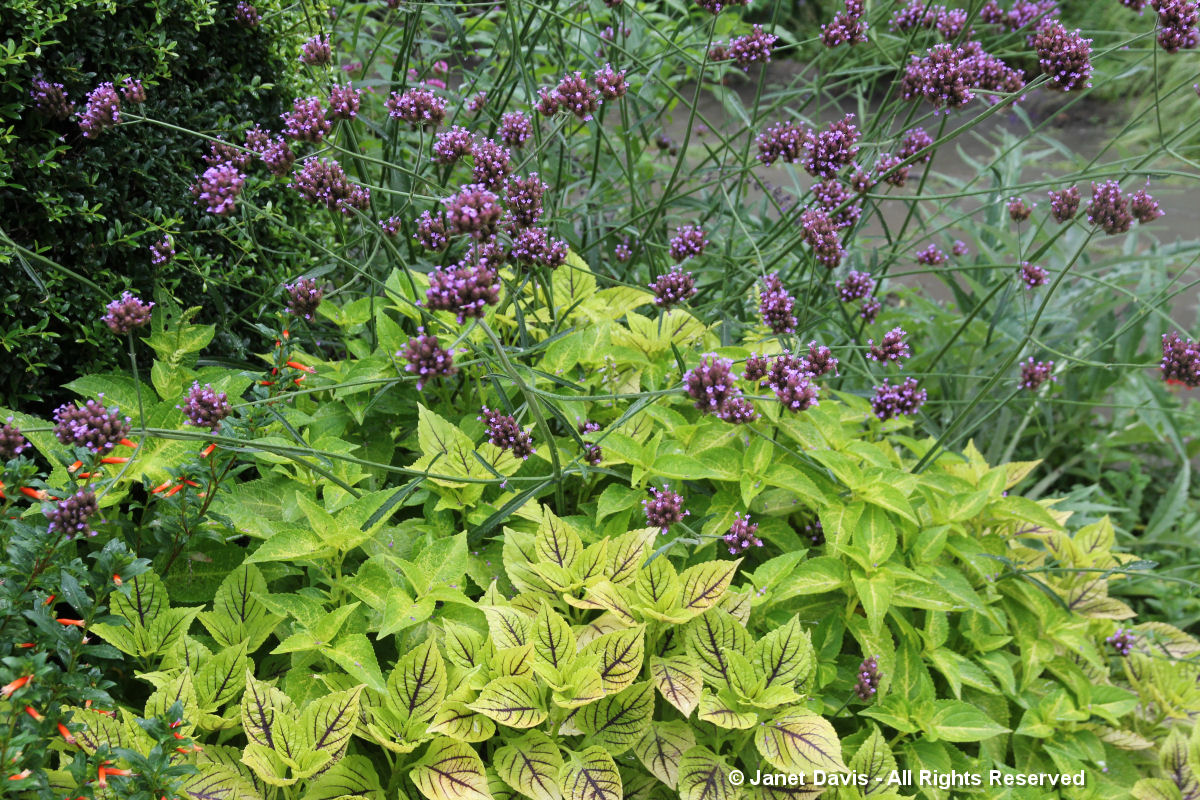
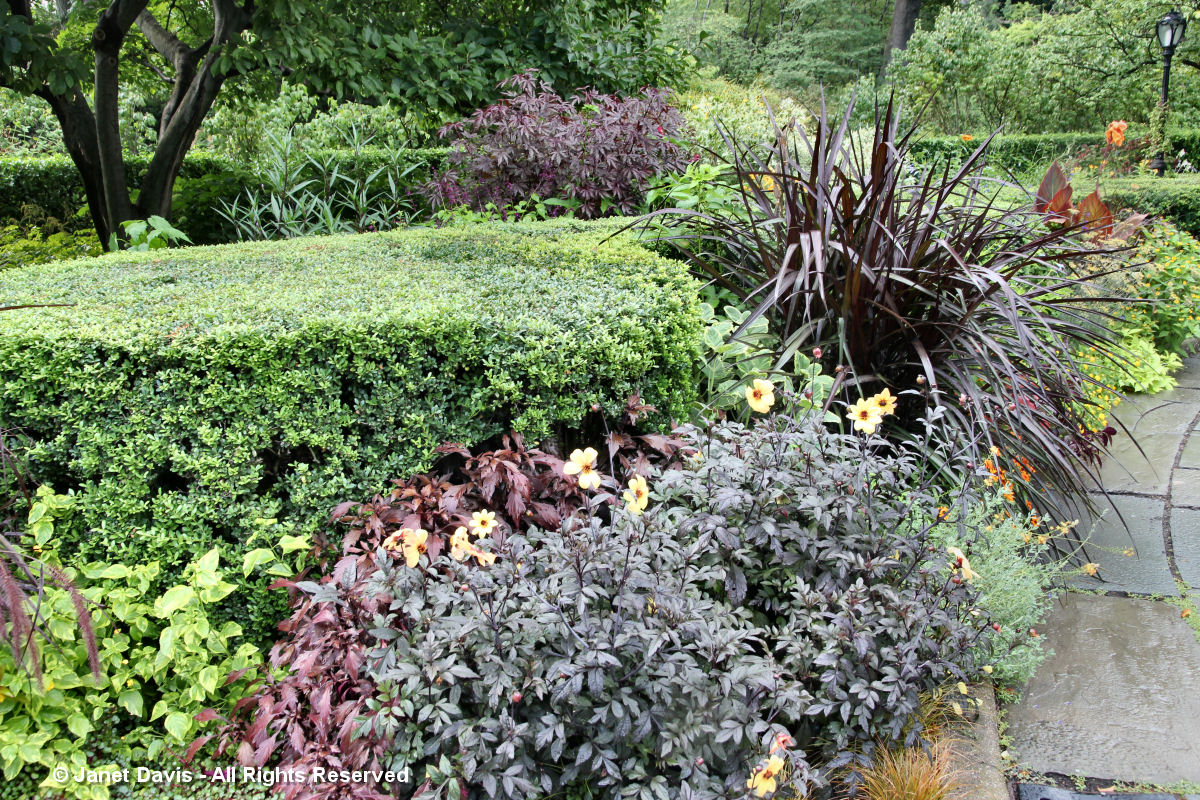
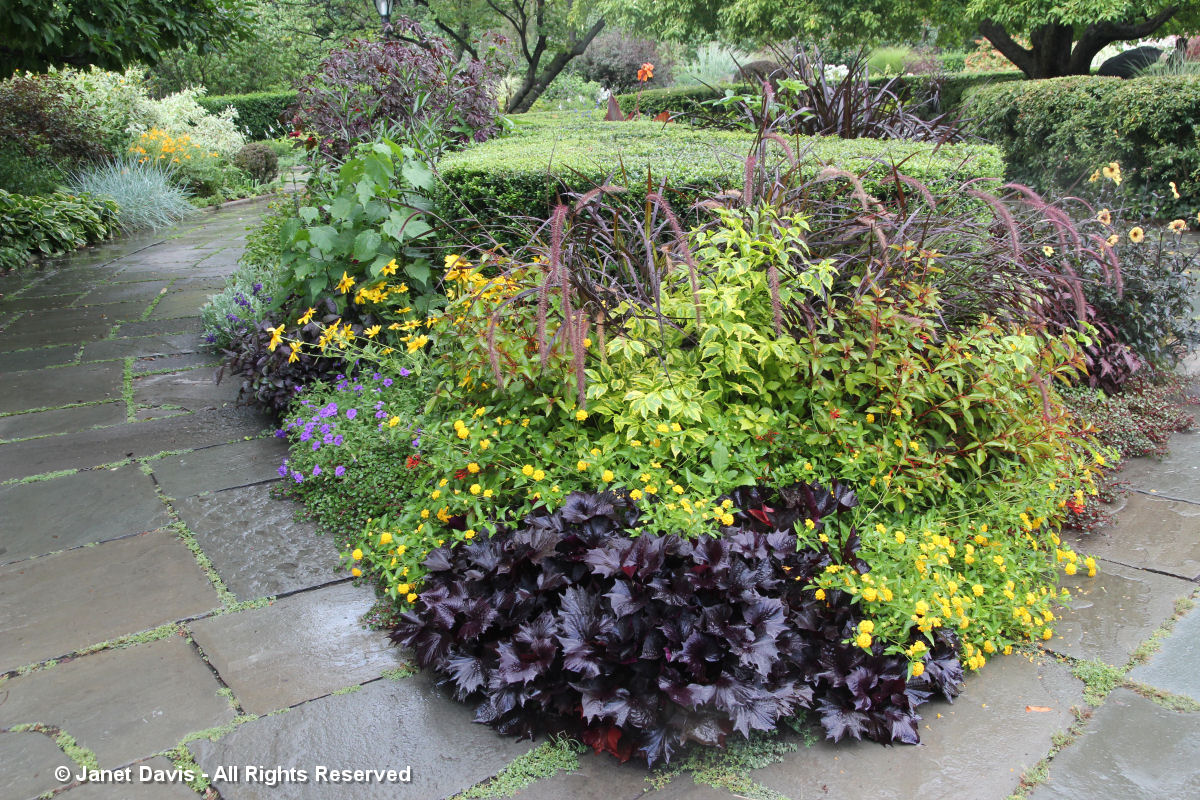
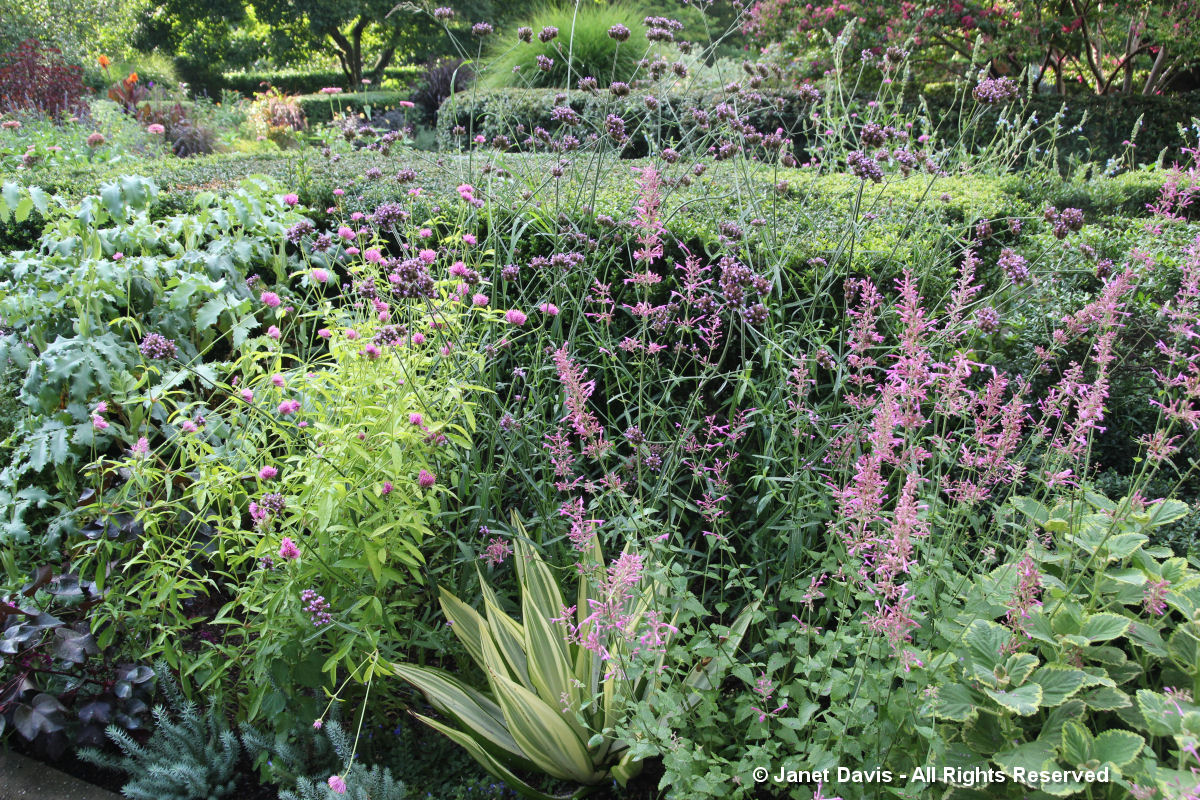
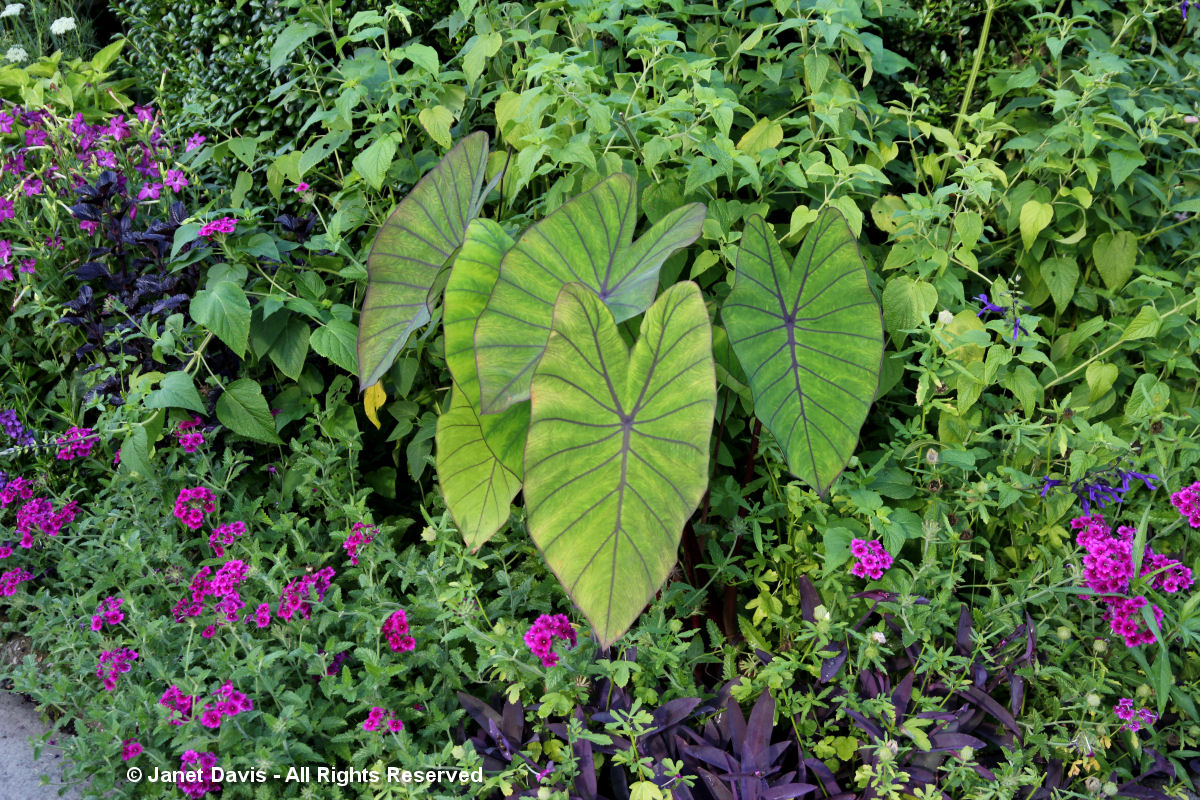
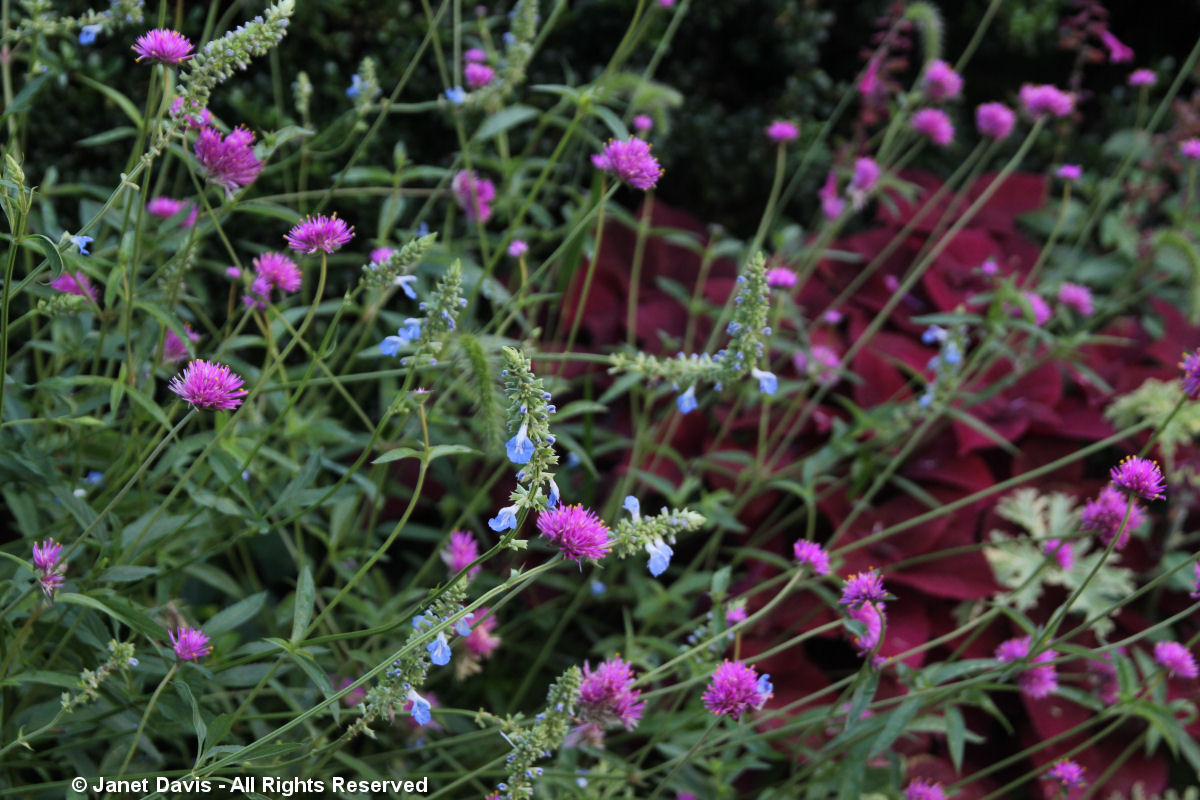
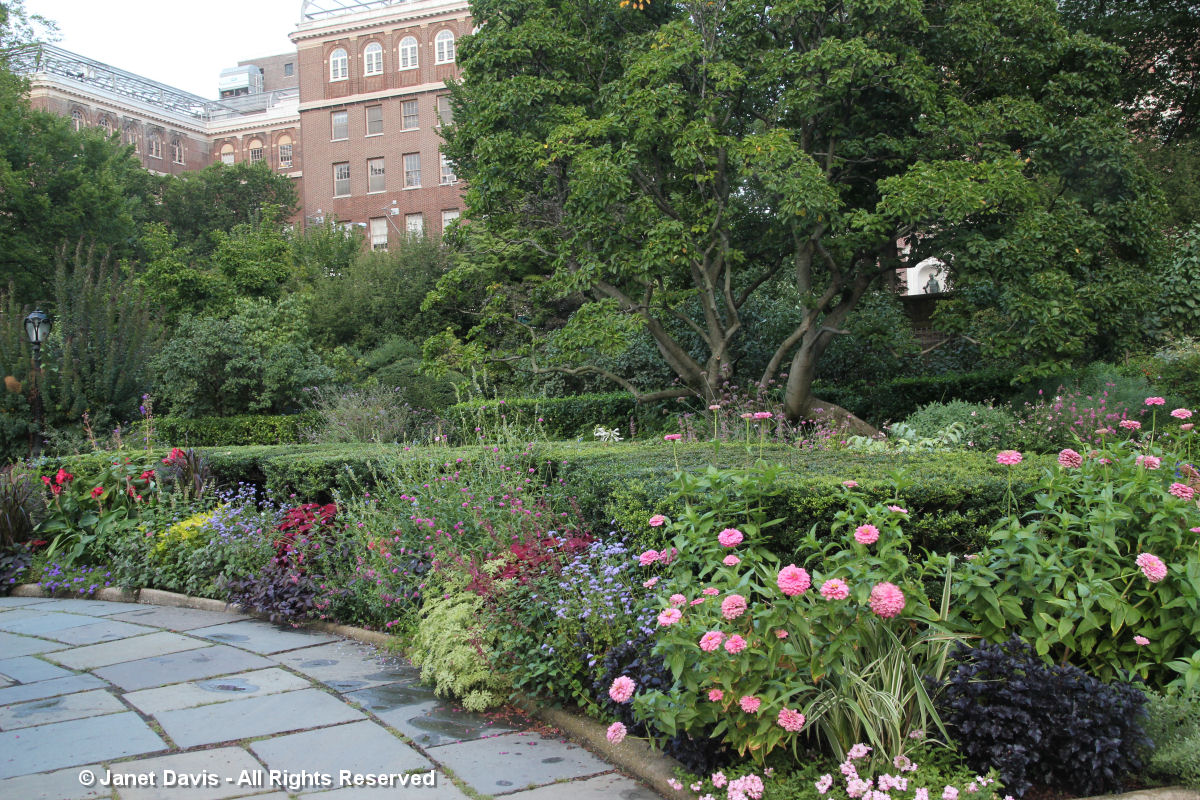
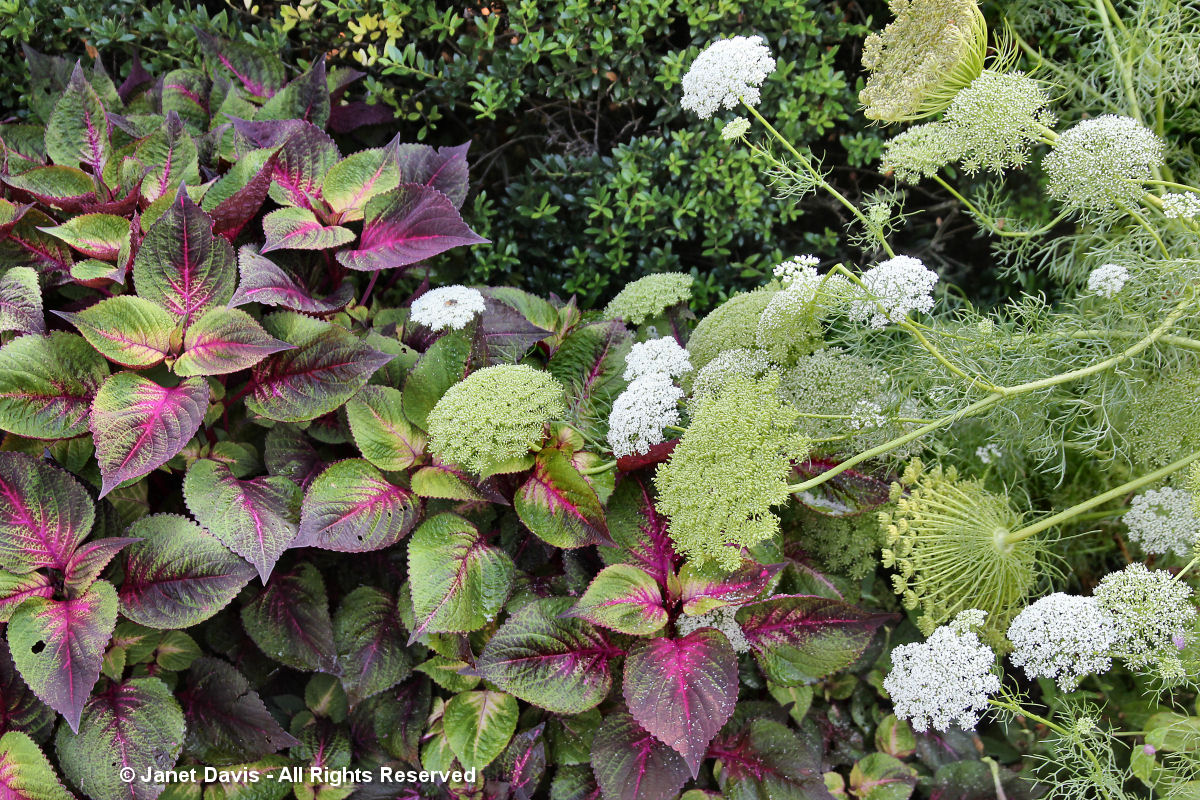
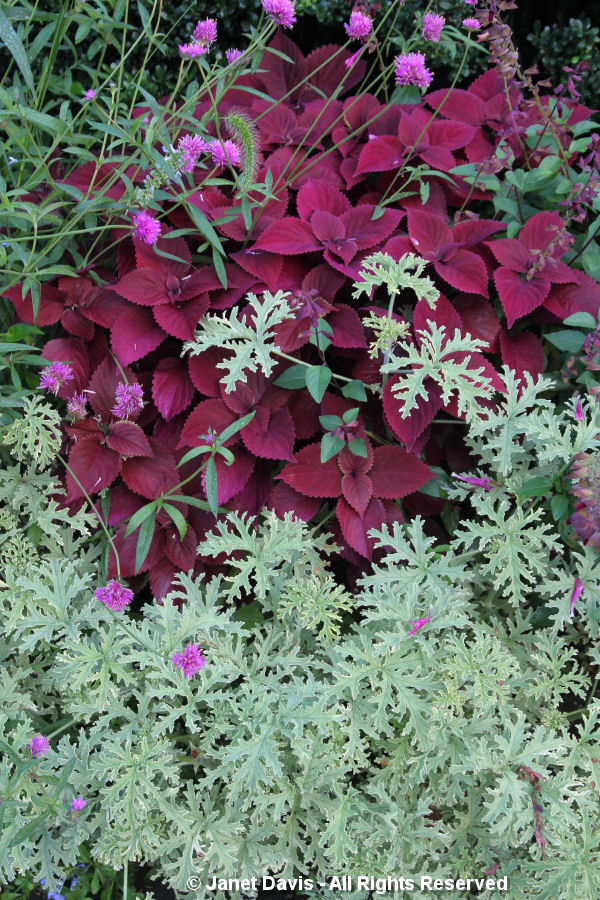
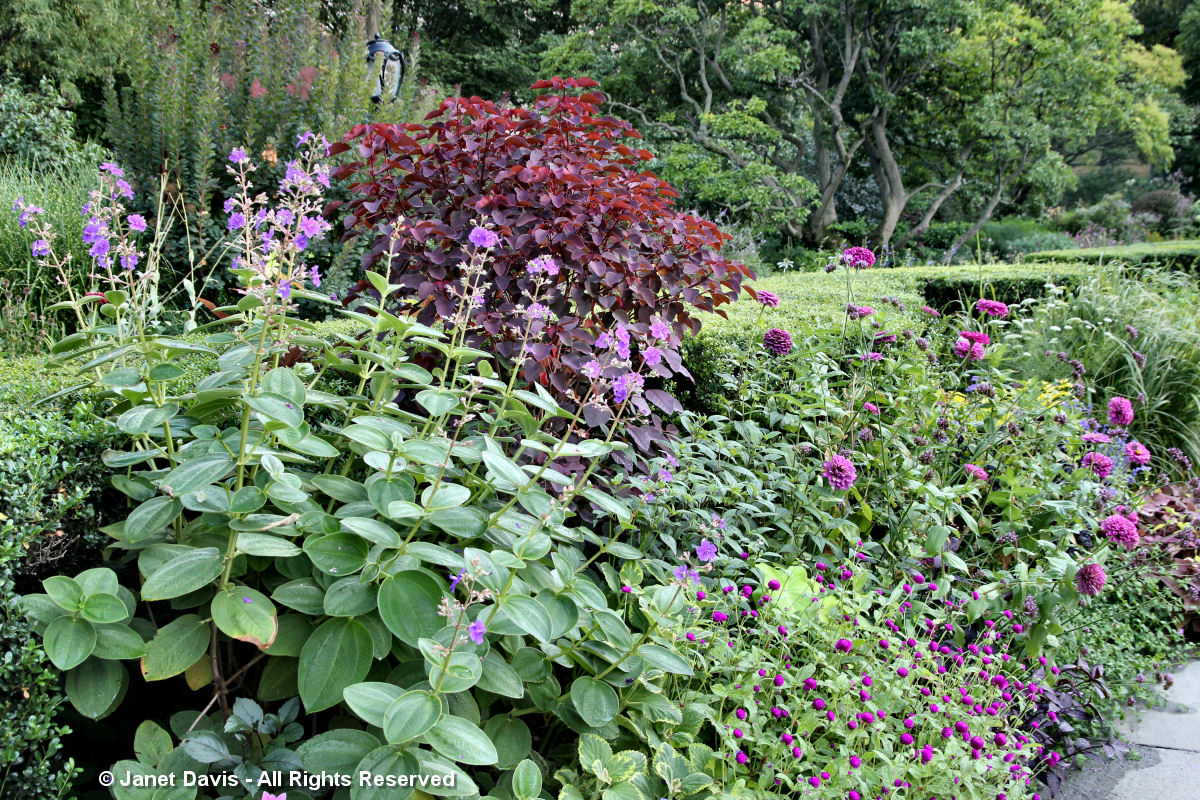
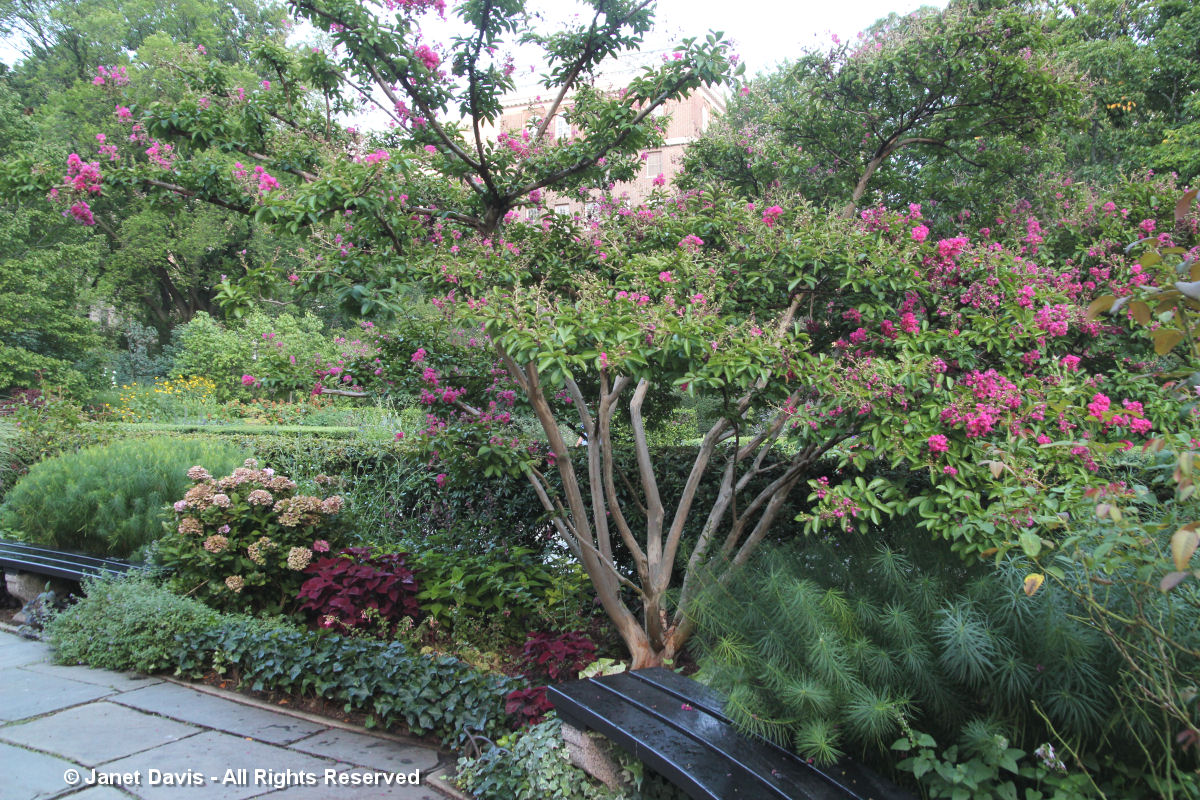
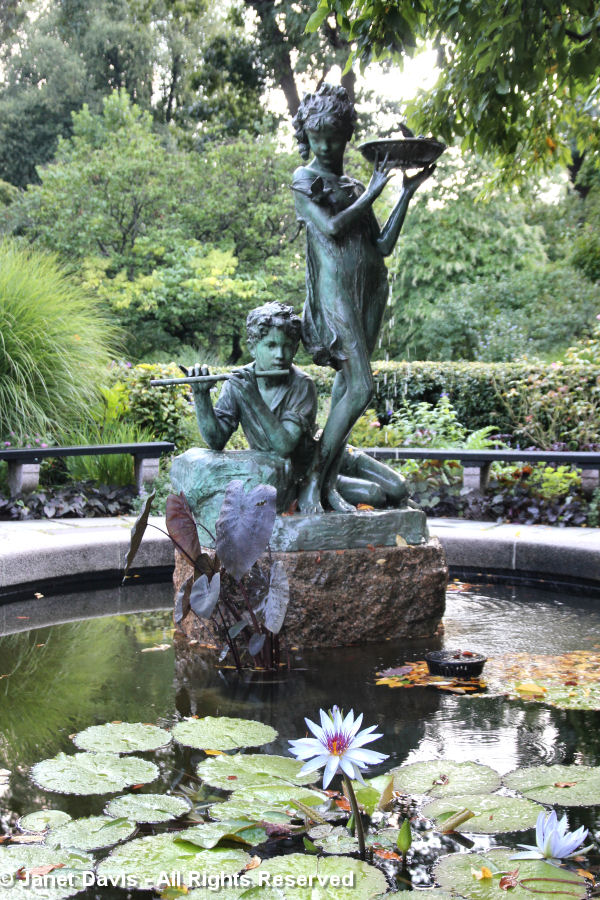
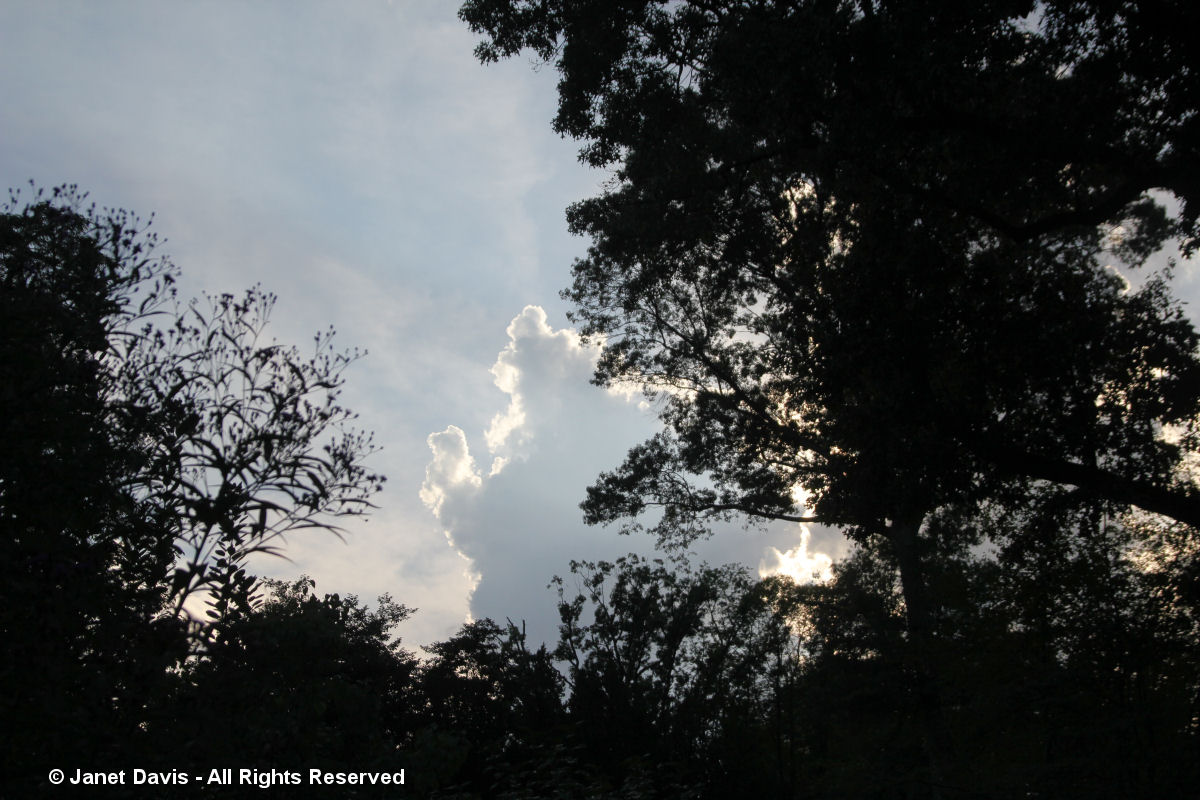
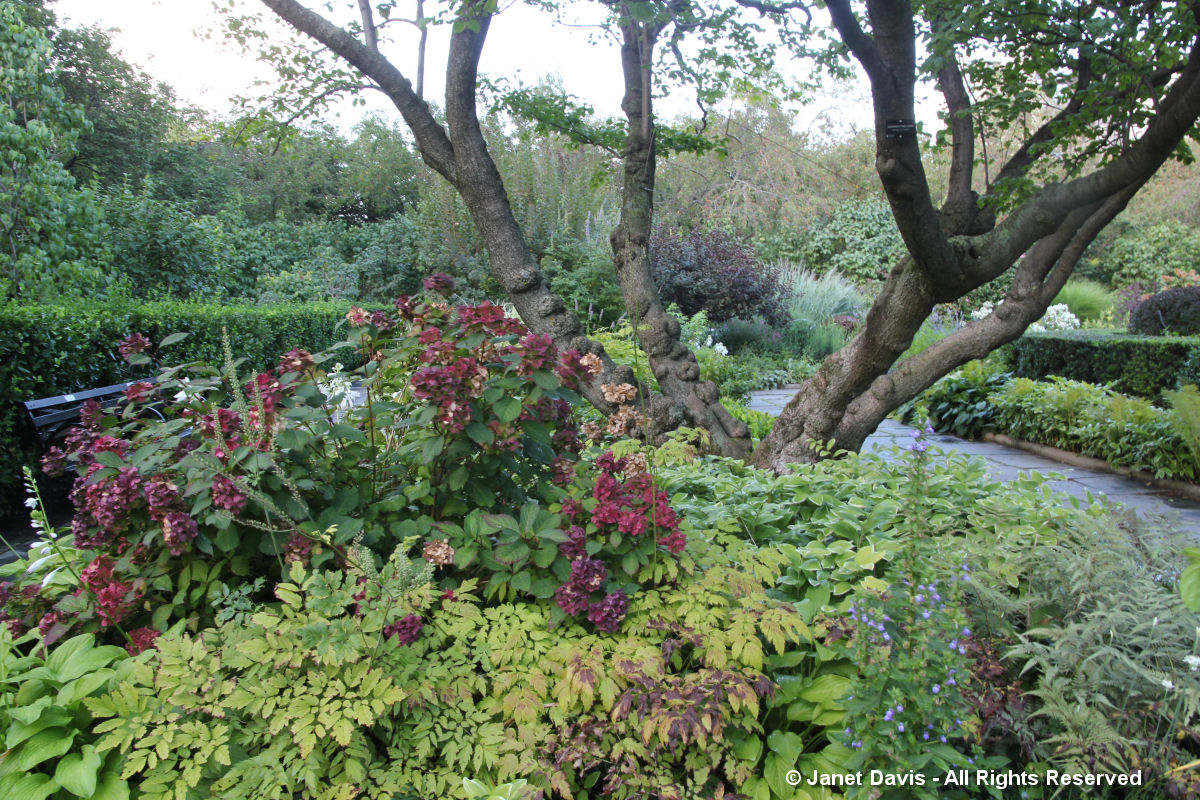
What a fabulous garden! Seen through your lens it is now on my list of must visits! Thank you for sharing…I love the bronze statues and fountains. My favorite picture is the one with blue saliva and the canna leaves as a backdrop!
Thanks, Laurin! It’s quite near a lot of cool museums as well. Plus all the other wonders of Central Park.
I’m catching up on some back emails and have just read this entry. OMG, what plants! what combos! what photos! Janet, a truly inspiring post.
Thanks, Pat. A lot of gardeners disdain annuals, but this garden is a spectacular example of annuals deployed creatively.